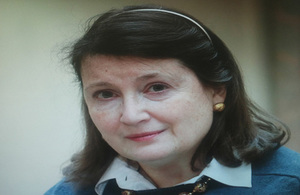HMA praises Britain and Turkmenistan relations
Thorda Abbott-Watt, British Ambassador to Turkmenistan marks the Day of Diplomatic Workers at a conference organised at the Institute of International Relations.

British Ambassador Thorda Abbott-Watt OBE
This is an expanded version of an address delivered by Thorda Abbott-Watt, the British Ambassador to Turkmenistan, at the conference organised at the Institute of International Relations on 19 February to mark the Day of Diplomatic Workers.
This year Turkmenistan commemorates its place at the heart of the Silk Road, the most influential network of trading relationships in history. For centuries these interconnecting land and shipping routes linked East and West, North and South. They brought goods not just from China, but from the Korean peninsula and Japan. They extended not just westward to Southern Europe but south, around the coast of India to Zanzibar and through the Arabian Gulf to Egypt.
We usually think of the Silk Road as a trading network, transporting merchandise: dates saffron, pistachios, frankincense, precious stones, and, of course, silk. But it also brought ideas and philosophies, culture and science. It enriched the civilisations through which it passed and they prospered because of it. Seafaring skills and medicinal plants spread from West to East. The West in turn acquired algebra, astronomy, Arabic numerals, printing and paper-making. And Turkmenistan stood at the centre of this channel of goods and information, open to the world. Merv was world’s second largest city in the 12th century. Only Kaifeng in China itself was larger.
But your friends, and these very much include the United Kingdom, do not look at Turkmenistan and see only a vivid history and a rich cultural heritage. We are looking to the future, when the countries of Central Asia are again linked by both physical and metaphorical roads and bridges, a future which once again encourages the permeability of ideas and innovation and people across borders.
There is a change coming to Central Asia. The reconstruction of the Silk Road by land and sea is part of this change. No country prospers in isolation, and the countries which make up this region recognise the opportunities which interconnectivity brings. And just as the camel trains once marched along the foothills of the Kopet Dag, so your time to be at the centre of events has come again.
My diplomatic colleagues and I each represent our own countries. But we also have Turkmenistan’s interests at heart. We commend your plans to expand transport links to your Central Asian neighbours. We commend your contribution to the equitable sharing of regional water resources through your chairmanship of the International Fund for Saving the Aral Sea. We believe that these processes, and the greater openness and understanding they will bring, are the best guarantee of peace and security and prosperity in Turkmenistan. All of the countries represented in Ashgabat would like to partner you on the journey you are taking. It is not a one way street. We have much to learn from your understanding of the dynamics of Central Asia from your unique geographical position at the heart of the region.
For our part, Britain is, and will remain, a reliable partner and an honest friend to Turkmenistan. We are proud of our European heritage and our common values. That will not change when we leave the European Union next year. As my Foreign Minister, Boris Johnson, has said, we will continue to be Europeans both geographically and psychologically: if you fly over the Channel between Britain and the continent of Europe you can see how narrow the Channel is. Spiritually, we will remain British and European, but also global. Against that background we will continue to work with you to promote good governance, democracy, the rule of law and human rights. We will continue to support your efforts to prevent and resolve conflict and to build stability, peace and prosperity. These are the common interests which bind us. We will maintain and strengthen our trading links as well. The Turkmenistan-United Kingdom Trade and Industry Council held in London earlier this year again demonstrated that when you are firm partners both sides have much to gain.
Last year our Prime Minister, Theresa May, pledged that we would become even more “a country that goes out into the world to build relationships with old friends and new allies.” Turkmenistan is among those old friends, and will remain one.
24 April 2018